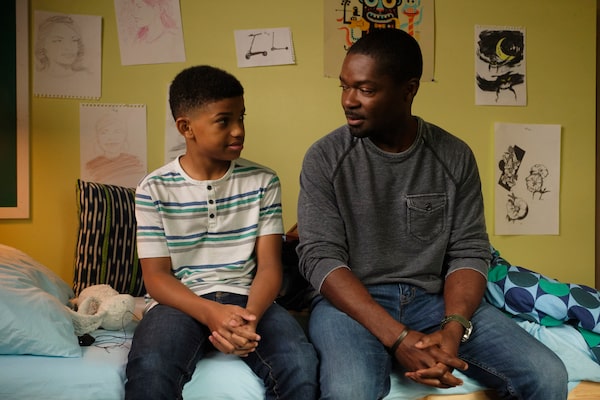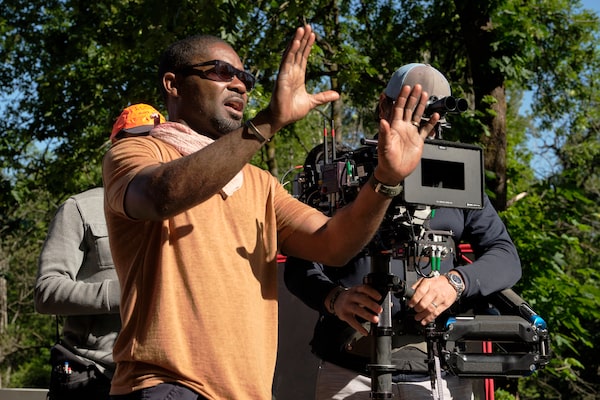
Lonnie Chavis, left, and David Oyelowo in The Water Man.Karen Ballard/RLJE films via AP
When Emma Needell’s script The Water Man showed up on the 2015 Black List (a compilation of great unproduced screenplays), David Oyelowo dived on it. It was exactly the kind of film he’d been looking for as an actor: a coming-of-age story with adventure, depth and meaning. Even though Gunner, the 11-year-old hero, was written as white, Oyelowo had no trouble seeing himself in the boy. He’d been doing that his entire life.
“The heroes of the films I loved growing up – The Goonies, Stand By Me, E.T. – even though they didn’t look like me, I could identify with what they were going through,” Oyelowo said in a phone interview. (He has one of acting’s great voices, rich and resonant, able to slide from purring to powerful seemingly without effort.) “But because they were always white boys, it subconsciously planted a seed that my existence was of less value and importance than theirs.” He’d long wanted to rectify that; here was his chance.
But Oyelowo knew that to properly change Gunner and his parents’ race, he had to do a lot more than simply swap in Black actors. He had to ensure that the characters’ lived experiences felt authentic. He had to put himself – both the 12-year-old iteration and the 40-year-old – into the script. The longer he and Needell worked on it, the clearer it became: he couldn’t only play Gunner’s father – he also had to make it his directorial debut. (Lonnie Chavis, who plays young Randall on This is Us, is Gunner; Rosario Dawson plays his mother.)

The Water Man is Oyelowo's directorial debut.Karen Ballard/RLJE films via AP
Along the way, Needell and Oyelowo also changed Joe, the boy who leads Gunner through a perilous forest, into Jo (Amiah Miller, Nova in War for the Planet of the Apes), because Oyelowo wanted his daughter to know that girls can lead, too. (He and his wife also have three sons.) They recast the town sheriff as a woman (Maria Bello), because Oyelowo had seen enough films where the local lawman was “a curmudgeonly, doughnut-eating guy.” And once on set, he had strong ideas about decor and costumes, because he wanted to see “African colours” in Gunner’s family’s life.
“I felt so much joy to be part of the change I’ve wanted to see for so long,” Oyelowo says. “The representation Gunner brings can help shift the world view of boys and girls of colour, and the world view of white children as well. It will help normalize the fact that we can all see ourselves in all different kinds of people.
“And to see Lonnie do it so beautifully, in a way that’s above reproach,” he continues. “It’s not tokenism. We’re not doing him a favour. He’s an incredibly talented young actor who should be afforded the opportunity to lead a cast, but in the past, probably wouldn’t have.”
In The Water Man, Gunner and his parents move to a small town in the U.S. Pacific Northwest, but life is far from idyllic. His mother is dying; his father is distant and demanding. When he hears a local legend – that a mythical man who lives deep in the forest possesses magical healing powers – he embarks on a quest to find him.
While Oyelowo was working on the script, his own mother died after a protracted illness. “So being on set, watching this character who’s doing everything he can to hold onto his mother – several days behind the monitor, I was trying to hold back tears,” he says. “The film is about the lengths we are prepared to go for those we love. That, I think, is the best of us as human beings. And to see it through the eyes of an 11-year-old I found even more poignant.”

The Water Man was exactly the kind of film Oyelowo had been looking for as an actor: a coming-of-age story with adventure, depth and meaning.Karen Ballard/RLJE films via AP
Watching his mother die taught Oyelowo that sometimes we hold so tightly to the past, we miss the beauty of the present; that instead of fighting sadness, we should be in it, feel it. The classic adventure films he projected himself into didn’t flinch away from those kinds of hard truths, and he was determined The Water Man wouldn’t either.
That his film arrives in the midst of a global pandemic only makes it more relevant, Oyelowo believes: “The sheer amount of people who are struggling economically, who are dealing with illness or death, have prompted so many conversations about what we should do for one another as a society or a community. That level of openness and truthfulness has become part of our day-to-day existence. Thankfully, we made the choice to be sincere, to let Gunner walk through these difficulties the way children do in life, but rarely do in film.”
As well, Oyelowo was determined to depict a loving but complex relationship between a Black father and son that wasn’t tied to racial struggle. “My sons are 18, 15 and 12, and I get it wrong every day,” he says. “But they know how much I love them. That I make sure of. I’m perpetually trying to be my best self, in order to guide them to be their best selves. I really wanted to show how there can be these disconnects even in loving families, which can become rites of passage.”
Oyelowo knows he’s lucky. He’s acted in more than 40 films, including his much-lauded turn as Martin Luther King in Selma. His directorial debut was fully financed. He was able to solicit advice from the likes of Ava DuVernay, Oprah Winfrey and Angelina Jolie. At the same time, he’s aware that “there is a real chance that if the colour of my skin were different, the trajectory of my career might be different.”
But he shrugs that thought off. “Better to be an underrated actor than an overrated one,” he says with a laugh. “I’m not going to stop until the narratives and the stories bubbling within me have been birthed.”
The Water Man is available on-demand, including Apple TV/iTunes and Google Play, starting May 25
Plan your screen time with the weekly What to Watch newsletter. Sign up today.